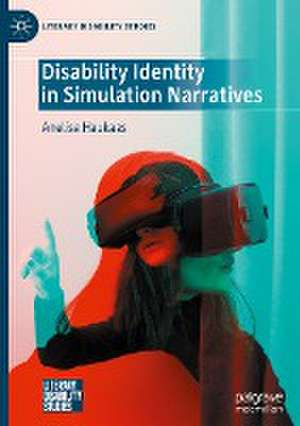Disability Identity in Simulation Narratives: Literary Disability Studies
Autor Anelise Haukaasen Limba Engleză Hardback – 15 dec 2023
Preț: 696.02 lei
Preț vechi: 818.85 lei
-15% Nou
Puncte Express: 1044
Preț estimativ în valută:
133.20€ • 138.27$ • 111.07£
133.20€ • 138.27$ • 111.07£
Carte tipărită la comandă
Livrare economică 22 martie-05 aprilie
Preluare comenzi: 021 569.72.76
Specificații
ISBN-13: 9783031444814
ISBN-10: 3031444817
Pagini: 189
Ilustrații: XIII, 189 p.
Dimensiuni: 148 x 210 mm
Greutate: 0.4 kg
Ediția:1st ed. 2024
Editura: Springer Nature Switzerland
Colecția Palgrave Macmillan
Seria Literary Disability Studies
Locul publicării:Cham, Switzerland
ISBN-10: 3031444817
Pagini: 189
Ilustrații: XIII, 189 p.
Dimensiuni: 148 x 210 mm
Greutate: 0.4 kg
Ediția:1st ed. 2024
Editura: Springer Nature Switzerland
Colecția Palgrave Macmillan
Seria Literary Disability Studies
Locul publicării:Cham, Switzerland
Cuprins
1. Introduction Other Worlds, Other Selves: Moving Beyond Escapism.- 2. ‘Everyone’s a Composite’: Rethinking Three of Cyberpunk’s Overlooked Women Writers as Posthumanists.- 3. The Performing Wiggin Siblings: Reading Ender’s Game through Disability Theory.- 4. The Threat of Silence in Mark Alpert’s Dystopian Simulation.- From Memes to Comics: Virtual Embodiment in Visual Rhetoric.- 5. The Player and the Avatar: Performing as Other.- 6. Learning Through Play: An Inclusive Pedagogy for the 21st Century.- 7. Conclusion The Augmented Self: Rethinking Virtual Simulation and Disability.
Notă biografică
Anelise Haukaas is an instructor at Laramie County Community College. She holds a PhD in English and the Teaching of English from Idaho State University, in addition to an MA, a BA, and a Graduate Certificate from George Mason University, where she studied literature and folklore. Her research interests include genre fiction, disability studies, folklore and mythology, popular culture, and new media. This is her first academic book.
Textul de pe ultima copertă
Disability Identity in Simulation Narratives considers the relationship between disability identity and simulation activities (ranging from traditional gameplay to more revolutionary technology) in contemporary science fiction. Anelise Haukaas applies posthumanist theory to an examination of disability identity in a variety of science fiction texts: adult novels, young adult literature and comics, as well as ethnographic research with gamers. Haukaas argues that instead of being a means of escapism, simulated experiences are a valuable tool for cultivating self-acceptance and promoting empathy. Through increasingly accessible technology and innovative gameplay, traditional hierarchies are dismantled, and different ways of being are both explored and validated. Ultimately, the book aims to expand our understandings of disability, performance, and self-creation in significant ways by exploring the boundless selves that the simulated environments in these texts allow.
Anelise Haukaas is an Assistant Professor of English at the College of Coastal Georgia, USA, as well as the faculty advisor of Seaswells, the art and literary magazine. Her research interests include genre fiction, disability studies, folklore and mythology, popular culture, and new media.
Anelise Haukaas is an Assistant Professor of English at the College of Coastal Georgia, USA, as well as the faculty advisor of Seaswells, the art and literary magazine. Her research interests include genre fiction, disability studies, folklore and mythology, popular culture, and new media.
Caracteristici
Brings literary disability studies into games studies discourse Explores disability, performance, and self-creation Addresses concerns about human-technology interconnectivity













